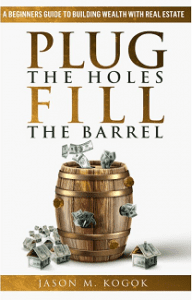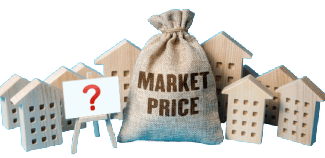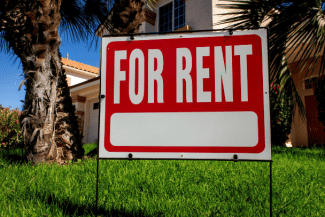Don’t ruin your portfolio by playing Rate Roulette!
By Jason Kogok, Author of Plug the Holes, Fill the Barrel: A Beginners Guide to Building Wealth with Real Estate
Before you read this article, we should get two things cleared up. First, I don’t know where interest rates will be in 6, 12, 24 months. And second, you probably don’t either!
The point is that trying to time the interest rate market is truly like gambling at the casino. I like to call it Rate Roulette. What I do know, with utmost certainty, is that rates in the future will be higher or lower than they are now!

As I preach to my students and fellow investors, we’re not in the interest rate game; we’re in the real estate game and interest rates are just a part of it. Of course, lower interest rates make things easier to achieve cash flow, however higher rates also present opportunities that don’t necessarily exist when rates are at historic lows.
First off, when rates go up and payments follow along upward, it prices people out of the market and thus reduces competition. Reduced competition can weigh in the favor of the investor. That increased payment may knock people out from an actual loan qualification standpoint, but many are simply knocked out due to fear that was created by the increased rate itself.
Secondly, when rates go up after being so low for so long, it keeps inventory naturally low because sellers with low rates don’t want to move and trade up in rate. We enter an opportunity zone with less demand and sellers that need to sell if they are willing to trade a 3% rate for a potential 7%. That smells like an opportunity to me.
While we’re on the topic, I want to bring to the forefront something that many investors don’t like that I preach – cash flow is NOT the most important investment decision. Is cash flow important? Of course, but the real question is must I have cash flow on Day One? No. As a matter of fact, there are many properties that I own that took years for the cash flow to grow and develop into something I was happy with.
When you solely hang your hat on cash flow, you have a tendency to have cash flow lead your decision-making process and that is a terrible idea (in my humble, not-so-humble opinion). You should be focused on buying the correct quality asset because if the market dips, stalls or crashes, rarely will cash flow save your hind if you purchased the wrong asset. Having a quality asset will always give you security no matter the market conditions. Now that I’m done with that soapbox, let me get back to rates…
Rates at their core, as they relate to an investor, are very simple. If I get a 7% interest rate today and the rates drop to 5% next year, I’ll simply refinance. Will I lose some money to do that? Of course, but that is a simple cost of doing business. That few thousand dollars to refinance will be dust in the wind down the road as I enjoy that 5% rate. What if rates go to 9% and I have the 7%? Simply, I’ll feel like the smartest guy in the room as others complain about rates at 9%.
I like to joke that everyone who currently has a 3-4% rate shouldn’t brag about their low rate because they are stuck. Their rate is so low that it prevents them from selling or using common leverage techniques to pull cash out because they are deathly afraid of losing that low rate. That rate is holding them hostage! At 7%, you have freedom to make guilt-free decisions.
By waiting, and playing “Rate Roulette,” you’re creating inaction and trying to time the market. Maybe rates keep going up and you’ll wish for 7% and maybe rates will drop to 5% years down the road and you will have lost years not participating in the market. You’ll miss any potential cash flow, principal paydown, possible appreciation, depreciation/tax expense and the ability to further your financial security.
And before you even say it, let me address the elephant in the room as it relates to values. Yes, values may go down in the future; they may also go up. Do I think they’ll go up double digit over the next few years? No way, but I do think there is a higher probability of appreciation versus depreciation.
And so, what if prices do drop some? Values only matter on the day you sell the property or use it as leverage; every other day your value creates fake wealth. Look at your retirement accounts and stock market – it’s been going down and yet, I bet many of you reading this still invest religiously into the stock market because you’ve been trained to understand the long-game of investing.
Yet, for some reason, many insist on trying to “time” the value and interest rate market. All they’re doing is wasting time while other investors are making adjustments to play within the parameters of what is in front of them, no matter the rates or values. And while we’re at it, please remember that if your stock retirement account goes down, there is no guarantee that it will EVER come back. At least with real estate, even if the values dip and don’t ever come back (unlikely), you’ll still be able to get cash flow, tax breaks and principal paydown. That all makes up for the value dip over time. Can’t say that for the stock market.
So, while you’re sitting there waiting for the rates to go back down or values to dip, some of the savviest investors are still taking advantage of the opportunity that exists in every market. Now, do you need to be more critical and methodical about what you buy? 100%. Should you have a strategic game plan for your assets and loans in case the market does go up or down? For sure, you’d be silly not to.
However, do you sit on the sideline for months and more likely years until we see how all this plays out? Not me. I’m not an interest rate investor, I’m a real estate investor and the rates are just a tool I use to get to my end goals. If you don’t know how to use the tools, don’t blame the tool, blame the user!
About the Author

















 Accessibility
Accessibility